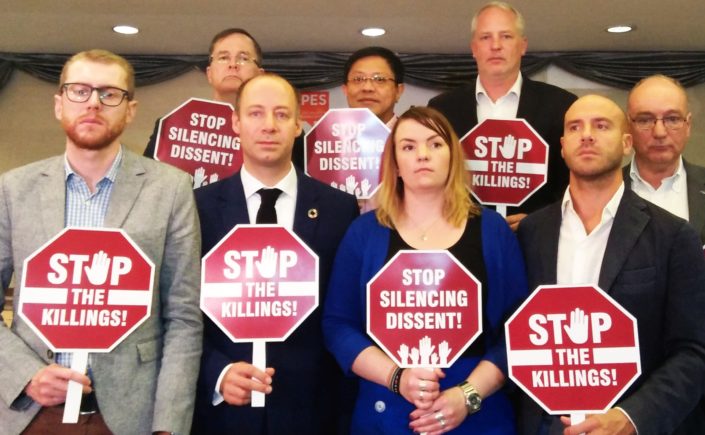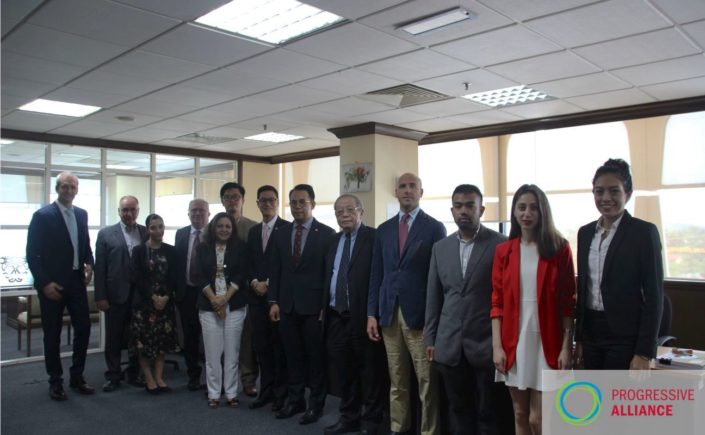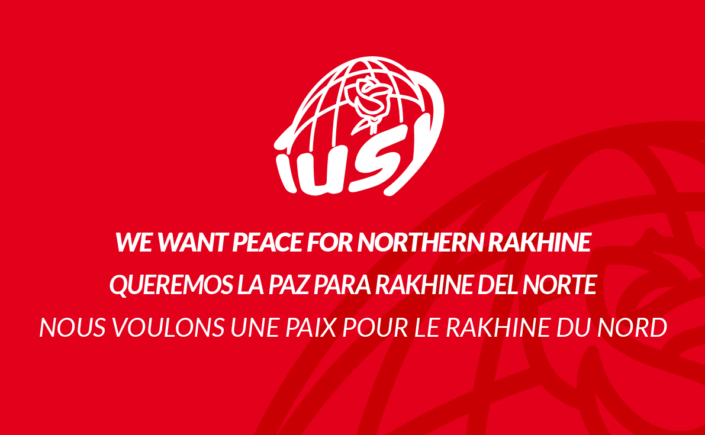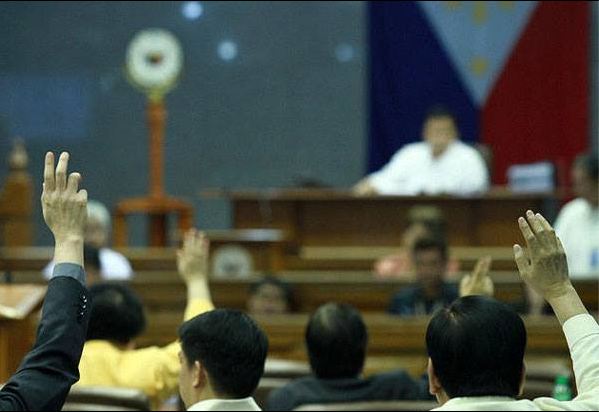It is with relief that the IUSY welcomes the ceasefire announced by the Arakan Rohingya Salvation Army (ARSA).Yet, it is shocking and disturbing to find the Myanmarese government snubbing the possibility of a reciprocation. IUSY sternly calls for an immediate end of any violence, especially on the innocent and young civilians.
This seemingly one sided ceasefire will hopefully bring the month-long insurgency in the Rakhine State of Myanmar to a temporary trough. This is reportedly to allow for aid and humanitarian assistance to be channeled to the thousands in need. IUSY calls for the Myanmar government to reconsider reciprocating the ceasefire for the sake of ordinary Myanmarese of all ethnicities and religions, including the Rohingya people.
The violent slaughter that took place in Myanmar’s Rakhine state, especially of the Rohingya people, is abhorrent and must immediately cease. For years, the Rohingya people have been systematically repressed and abused. Since the attack on 25th August, when the Myanmarese Government activated its military forces to curb the influence of the ARSA, thousands have fled to Bangladesh, while thousands of those stuck in Rakhine have been massacred.
The Rohingya humanitarian crisis is not one isolated within Myanmar, but a regional one with its toxicity over spilling far and wide across South-east Asia. The killings and continued alienation of the Rohingya people has profoundly far-reaching political, social and/or economic implications, felt even in Malaysia, Indonesia and Thailand.
Extraordinary circumstances call for extraordinary actions; ‘the ASEAN way’ of non-interference has proven futile in ensuring national challenges remain within national borders. ASEAN governments should start bilaterally engaging the Myanmar government in stating a clear demand for the state-sponsored violence to immediately stop. No government should be silent when atrocities are being committed against the innocent and helpless civilians.
Whilst marches and rallies in solidarity of those affected have the utmost support from the IUSY, The respective Foreign Ministries should exercise leadership, and immediately step up several gears in mobilising their leaders and leverages within the UN, especially during the General Assembly on 19 September. These countries should also use its influence within the ASEAN Intergovernmental Commission on Human Rights (ASEAN ICHR) to urge Myanmar and its government to put an immediate stop to the senseless killings.
IUSY is mindful of Bangladesh’s acceptance of Rohingya refugees.
According to the UNHCR, before the recent refugee influx, there were already up to 500,000 undocumented refugees in Bangladesh. The situation is precarious and has reportedly reached a “breaking point”. Staff capacity and resources are insufficient. With the overflowing camps unable to accommodate the new arrivals, thousands are now cooped up under emergency tents, in makeshift camps or lying out in the open. An adequate supply for all refugees can no longer be ensured. The current floods in the area are complicating the situation even further. To address the urgent needs, the government has planned to set up new camps and if necessary to expand already existing ones.
For the Bangladeshi government, one of the most disconcerting issues is religious extremism and its instrumentalisation and victimization of refugees (i.e. refugees being recruited and trained by local extremists). The Bangladeshi government has called on the international community for immediate support – namely to put pressure on the Myanmar government to recognise Rohingyas as citizens. IUSY urges the international community to also channel aid to the Bangladeshi government to alleviate the pressures of the current crisis.
We commend Indonesia for having taken on an active role in assisting the Rohingya people, it’s time that Malaysia does her share in the name of humanity. As a human race, we must unite in actively condemning those who have and are perpetrating any form of violence towards any group of people, regardless of race or religion. Hatred, oppression, and violence should not have a place in any country, and all self-proclaimed government should ensure that they stands tall and live up to their reputation as champions of human rights.
IUSY does not only condone any act of violence committed by any groups or governments. We also condemn the words and actions of those fanning the flames of hatred and polarisation, by accrediting the violent actions of a few to an entire ethnic group and/or the believers of an entire faith. Our only concern is for the safety and well-being of civilians regardless of race or religion.
IUSY joins the international community’s call to end the senseless killings of the Rohingya people, and other innocent civilians caught up in this bloody conflict in Myanmar and for the latter’s government to stop the state-sanctioned military attack in Rakhine and instead focus its efforts in ensuring the safety of the survivors of the massacre.
In the interest of upholding the truth, with the cooperation of the Progressive Alliance, IUSY have compiled some well-researched key findings and verified facts.
The Rohingya in Myanmar have been for years, and continue to live in dire conditions favourable to extremism. The Rohingya are probably one of the most persecuted minorities in the world. The conflict between the group and the Myanmar government has historic, religious and ethnic roots; though the current conflict is largely a military-led expulsion resulted by a militant group claiming to represent the entire ethnicity. It is exacerbated by systematic discrimination and the portrayal of the group as an economic burden as well as a security risk. As a result, an increasing number of Rohingyas have fled to Bangladesh.
Reliable information is scarce. As of now, international journalists have had no access to the area. Therefore, any facts and footage have to be treated with extreme caution. The unprecedented solidarity wave in the Muslim world means that a lot of fake footage is spreading through social media. Other footages and pictures depicting Buddhists being treated violently are used by those countering that narrative. There is a spiral of hatred and violent propaganda that is driving a fabricated Rohingya versus Buddhist narrative that is growing rampantly.
Militant Extremism by a small minority of Rohingya is real. It is unclear to what extent the Arakan Rohingya Salvation Army (ARSA) is supported by Rohingya civilians. But they have proven their capability to stage coordinated attacks, spread propaganda and recruit fighters. ARSA’s activities could indicate a renewed Islamic militancy among Rohingyas. However, as ARSA is ill-equipped and primitively armed, the excessive counteractions of the Burmese Army might either eradicate the group or trigger a counter propaganda campaign leading to a surge in recruits.
Militant Nationalism and religious hatred towards Muslims and Rohingya stoked by some small groups of Buddhist monks is equally real. Though not entirely related to this bout of violence, it is sure to capitalise on it to further fan the fires of fear and polarisation. U Wirathu is a firebrand Bhuddist monk, known to some international media as the ‘face of Buddhist terror’ – he is synonymous with the Organization for the Protection of Race and Religion (Ma Ba Tha) which is well known for their provocative anti-Islam pronouncement. U Thuzana is a charismatic monk in the state of Karen linked with armed Democratic Buddhist Karen Army (DKBA). The alignment of U Wirathu and U Thuzana through anti-Muslim Buddhist activism is heightening religious tensions across the country – including with Christians. U Thuzana and his armed men will capitalize on renewed conflict in Rakhine in the service of their own politico-religious projects. The rising confluence of armed groups and nationally prominent Buddhist monk extremists introduces a disturbing new dynamic to Myanmar’s religious-political conflicts that, despite official efforts to curb the Ma Ba Tha and its message of hate, seem likely to get worse before they get better.
An international commission led by Kofi Annan recently published a report on the situation. Their main finding is that without fixing the 1982 citizenship law and even bringing back Rohingyas to Myanmar (as happened after previous clashes with international support) would not prevent but merely delay the next cycle of violence.
Myanmar’s transition from military dictatorship to democracy is far from over. The country is dealing with a transition to civilian rule, a market economy, functioning statehood and bureaucracy, open society, capitalist consumerism and sustainable peace. The military elites are still the strongest political force. Aung San Suu Kyi focuses on consolidating domestic support and evades any conflict with the military establishment.
Some 290.000 Rohingya have arrived in Bangladesh since 25 August, according to a spokesman for the UN refugee agency. Around 27.000 Buddhists and Hindus have also been displaced by ARSA attacks. Fear and violence stalk Rakhine state as communities turn on each other and villages continue to be set alight.
The situation in the Bangladesh Rohingya camps has reached a breaking point. Resources and staff are insufficient. Thousands are living in emergency tents, makeshift camps or in the open. Without international support, a humanitarian catastrophe will ensue.
In view of the above, the IUSY urgently calls for:
- Immediate cessation of military activities in Northern Rakhine
- Immediate re-admission of UN Agencies and INGOs into the crisis area
- Immediate additional funding to first responders and humanitarian workers in Bangladesh
- Access of the UNHCR fact-finding mission to Rakhine
- Continued dialogue between Bangladesh and Myanmar. Setting up of a Joint Border Management
- Admission of international press to cover the situation in Northern Rakhine
- International Conference on the proposals of the Advisory Commission on the Rakhine State
- International Conference on Regional Implications of the Kofi Annan report by receiving cross-partisan delegations from regional countries esp. Bangladesh, but also India, Thailand, Indonesia, Australia, Malaysia.
- A global solidarity action on social media. Leaders or activists holding placard with hashtag #freedom4rohingya #justice4rohingya #solidarity4rohingya
Howard Lee
President of the International Union of Socialist Youth





 (
(